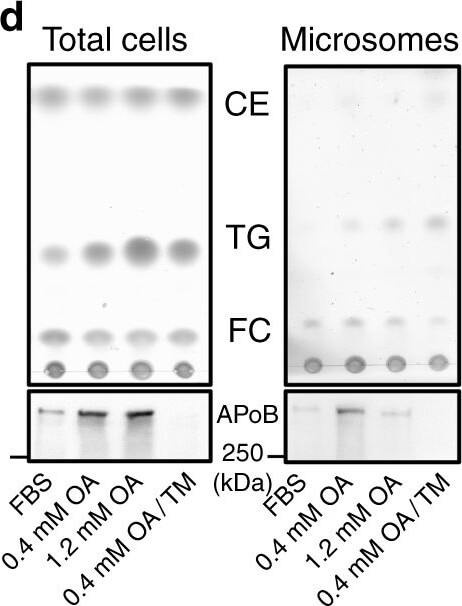APOLIPOPROTEIN B Antibody
Goat Polyclonal
13 References
600-101-111
1 mg
Liquid (sterile filtered)
WB, ELISA, IHC, IF, EM, IP, Multiplex
Human
Goat
Shipping info:
$50.00 to US & $70.00 to Canada for most products. Final costs are calculated at checkout.
Product Details
Anti-Apolipoprotein B (GOAT) Antibody - 600-101-111
goat anti-Apolipoprotein B antibody, Apo B-100, Apo B-48, APOB protein antibody, Apolipoprotein-B 100 antibody, Apolipoprotein B 48 antibody, Apolipoprotein B antibody, FLDB antibody
Goat
Polyclonal
IgG
Target Details
APOB - View All APOB Products
Human
Native Protein
apoLipoprotein Type B was isolated from human plasma by density gradient centrifugation followed by HPLC purification.
This product has been prepared by immunoaffinity chromatography using immobilized antigens followed by extensive cross-adsorption against other apoLipoproteins and human serum proteins to remove any unwanted specificities. Typically less than 1% cross reactivity against other types of apoLipoprotein was detected by ELISA against purified standards. This antibody reacts with human apoLipoprotein B and has negligible cross-reactivity with Type A-I, A-II, C-I, C-II, C-III, E and J apoLipoproteins. Specific cross reaction of anti-apoLipoprotein antibodies with antigens from other species has not been determined. Non-specific cross reaction of anti-apoLipoprotein antibodies with other human serum proteins is negligible.
Application Details
ELISA, EM, IF, IHC, IP, WB, Multiplex
- View References
Anti-apoLipoprotein antibodies have been used for indirect trapping ELISA for quantitation of antigen in serum using a standard curve, for immunoprecipitation and for western blotting for highly sensitive qualitative analysis.
Formulation
1.0 mg/mL by UV absorbance at 280 nm
0.125 M Sodium Borate, 0.075 M Sodium Chloride, 0.005 M EDTA, pH 8.0
0.01% (w/v) Sodium Azide
None
Shipping & Handling
Wet Ice
Store vial at 4° C prior to opening. This product is stable 4° C as an undiluted liquid. Dilute only prior to immediate use. For extended storage mix with an equal volume of glycerol, aliquot contents and freeze at -20° C or below. Avoid cycles of freezing and thawing.
Expiration date is one (1) year from date of receipt.
Anti Apolipoprotein B antibody recognizes the gene product of APOB that is the primary apolipoprotein of low-density lipoproteins, which is responsible for carrying cholesterol to tissues. While it is unclear exactly what functional role APOB plays in LDL, it is the primary apolipoprotein component and is absolutely required for its formation. What is clear is that the APOB on the LDL particle acts as a ligand for LDL receptors in various cells throughout the body. Through a mechanism that is not fully understood, high levels of APOB can lead to plaques that cause vascular disease (atherosclerosis), leading to heart disease. There is considerable evidence that levels of APOB are a better indicator of heart disease and cardiovascular risk than total cholesterol or LDL. However, primarily for historic reasons, cholesterol, and more specifically, LDL-cholesterol, remains the primary lipid test for the risk factor of atherosclerosis.
Ugrankar-Banerjee R et al. (2023). The fat body cortical actin network regulates Drosophila inter-organ nutrient trafficking, signaling, and adipose cell size. eLife.
Applications
IF, Confocal Microscopy
Niimi M et al. (2021). Isolation and Analysis of Plasma Lipoproteins by Ultracentrifugation. J Vis Exp.
Applications
WB, IB, PCA
Zhang T et al. (2020). Hyperhomocysteinemia and Dyslipidemia in point mutation G307S of cystathionine β-synthase-deficient rabbit generated using CRISPR/Cas9. Lipids Health Dis.
Applications
WB, IB, PCA
Sołtysik et al. (2019). Nuclear lipid droplets derive from a lipoprotein precursor and regulate phosphatidylcholine synthesis. Nature Communications
Applications
IF, Confocal Microscopy; WB, IB, PCA
Morishita H et al. (2019). A critical role of VMP1 in lipoprotein secretion. Elife.
Applications
WB, IB, PCA
Soltysik K et al. (2019). Nuclear lipid droplets derive from a lipoprotein precursor and regulate phosphatidylcholine synthesis. Nat Commun.
Applications
WB, IB, PCA
Lu et al. (2018). Spontaneous severe hypercholesterolemia and atherosclerosis lesions in rabbits with deficiency of low-density lipoprotein receptor (LDLR) on exon 7. EBioMedicine
Applications
WB, IB, PCA
Piver E et al. (2017). Ultrastructural organisation of HCV from the bloodstream of infected patients revealed by electron microscopy after specific immunocapture. Gut.
Applications
Immuno-gold Electron Microscopy
Imai, N et al. (2015). Hepatocyte-Specific Depletion of UBXD8 Induces Periportal Steatosis in Mice Fed a High-Fat Diet. PloS One
Applications
IF, Confocal Microscopy; Multiplex Assay
Boyer A et al. (2014). The association of hepatitis C virus glycoproteins with apolipoproteins E and B early in assembly is conserved in lipoviral particles. J Biol Chem.
Applications
IP, Co-IP
Nauli AM. (2014). Chylomicrons produced by Caco‐2 cells contained ApoB‐48 with diameter of 80–200 nm. Physiol Rep.
Applications
E, EIA
Mayasari DS et al. (2013). Rhodamine-labeled LDL as a tool to monitor the lipoprotein traffic in experimental model of early atherosclerosis in mice. Kobe J Med Sci.
Applications
IF, Confocal Microscopy
Fan J et al. (2001). Transgenic rabbits expressing human apolipoprotein(a) develop more extensive atherosclerotic lesions in response to a cholesterol-rich diet. Arteriosclerosis, Thrombosis, and Vascular Biology
Applications
IHC, ICC, Histology
This product is for research use only and is not intended for therapeutic or diagnostic applications. Please contact a technical service representative for more information. All products of animal origin manufactured by Rockland Immunochemicals are derived from starting materials of North American origin. Collection was performed in United States Department of Agriculture (USDA) inspected facilities and all materials have been inspected and certified to be free of disease and suitable for exportation. All properties listed are typical characteristics and are not specifications. All suggestions and data are offered in good faith but without guarantee as conditions and methods of use of our products are beyond our control. All claims must be made within 30 days following the date of delivery. The prospective user must determine the suitability of our materials before adopting them on a commercial scale. Suggested uses of our products are not recommendations to use our products in violation of any patent or as a license under any patent of Rockland Immunochemicals, Inc. If you require a commercial license to use this material and do not have one, then return this material, unopened to: Rockland Inc., P.O. BOX 5199, Limerick, Pennsylvania, USA.

